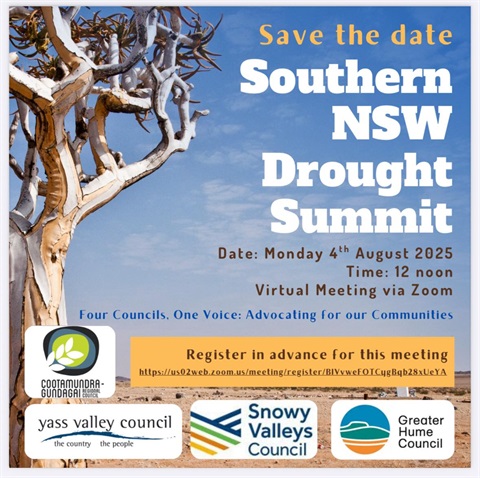Regional Farmers Call for Immediate Drought Support
Published on 06 August 2025

Regional farming leaders made an urgent appeal to government ministers at the Southern NSW Drought Summit on Monday, 4 August, calling for immediate financial and practical support as worsening drought conditions continue to impact farmers across Southern New South Wales.
The summit, organised by Council Mayors from Snowy Valleys, Greater Hume, Cootamundra-Gundagai, Wagga Wagga and Yass Valley, brought together government representatives, including NSW Agriculture Minister Tara Moriarty and seven members of the NSW Parliament alongside local farmers, agronomists and rural support services from all drought-affected regions across southern NSW.
Julia Ham, Mayor of Snowy Valleys Council, said 49% of NSW was now affected by drought, and that even the most resilient producers were reaching breaking point.
“The summit highlighted that NSW farmers are being left behind compared to other states offering direct drought subsidies, and the mental health of our communities is deteriorating under the pressure,” Mayor Ham said.
“There is a clear disconnect between government policy and on-ground reality, and we’re calling for drought to once again be recognised as a natural disaster in NSW.”
During the summit, local farmers spoke passionately about the growing toll of fodder and water shortages, record-high freight costs, and widespread pasture loss not just on their livestock and livelihoods, but also on their mental health and family wellbeing.
Julian Roche, a third-generation beef producer from Yaven Creek, gave a powerful account of the emotional strain that drought had on his business and community. The drought has now affected the breeding cycle, which will have long-lasting impacts on his business. He said the scale and magnitude of this drought have never been seen before.
Barney Hyams, an Orchardist and Grazier from Batlow and former Riverina Local Land Services chairperson, reflected on the support previously provided during times of drought and the changes that have since been implemented. He spoke of the compounding challenges faced by farmers, first the devastation of bushfires, followed by a prolonged two-year drought and soaring input costs, all of which have farmers in a dire situation.
A key outcome of the summit was the proposal to establish a NSW government-led, producer-informed Drought Taskforce to oversee implementation of the summit’s recommendations.
The taskforce would bring together local farmers and producers, rural support services, and government agencies to ensure that policy and action reflected on-the-ground realities.
A clear roadmap for action was outlined, including:
- Immediate financial relief through freight and fodder subsidies, emergency grants, and Local Land Services (LLS) waivers;
- Targeted recovery programs to support restocking, pasture regeneration, business support and mental health services; and
- Long-term reform of the National Drought Agreement to recognise drought as a natural disaster and incentivise resilience through tax incentives and on-farm preparedness measures.
“There is no time to wait,” said Mayor Ham. “The recovery from drought is painfully slow and precarious”.
“We need immediate relief of emergency feed and water, support for medium-term recovery of restocking, debt management and supply chain issues, and investment in long-term drought resilience for our farming communities, including breeding herd restocking and policy reform.
“We are calling on the Government to establish the Taskforce, reclassify drought as a natural disaster, provide targeted financial relief, and reform outdated support frameworks to reflect modern farming and community needs. Without action, we risk the collapse of local industries, rural communities, and food production capacity.
“A failed spring would be catastrophic, further delaying the replenishment of critical fodder reserves and compounding already severe financial and mental health strain. Producers face the brutal combination of soaring input costs, potential declines in commodity prices, and the emotional toll of rebuilding with no guarantee of stability.”
Mayor Ham concluded, “The summit made one thing clear: producers have done all they can. The current drought has exposed systemic gaps in how we support rural communities before, during and after drought. Government leadership is now essential. Support must be timely, coordinated and practical - and rooted in the experience of those on the land.”
-ENDS-